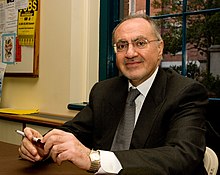Ali Allawi
Ali Allawi | |
|---|---|
 Ali Allawi in 2008 | |
| Minister of Finance | |
| In office 6 April 2005 – May 2006 | |
| President | Jalal Talabani |
| Prime Minister | Ibrahim al-Jaafari |
| Preceded by | Adil Abdul-Mahdi |
| Succeeded by | Baqir Jabr al-Zubeidi |
| Minister of Defence | |
| In office April 2004 – June 2004 | |
| President | Ghazi Mashal Ajil al-Yawer (acting) |
| Prime Minister | Ayad Allawi |
| Succeeded by | Hazim al-Shaalan |
| Minister of Trade | |
| In office September 2003 – June 2004 | |
| Preceded by | Coalition Provisional Authority |
| Succeeded by | Adil Abdul-Mahdi |
| Personal details | |
| Born | 1947 Baghdad, Kingdom of Iraq |
| Relations | Ahmed Chalabi (uncle) |
| Alma mater | Massachusetts Institute of Technology Harvard University |
| Website | aliallawi.com |
Ali Abdul-Amir Allawi was Minister of Trade and Minister of Defense in the cabinet appointed by the Interim Iraq Governing Council from September 2003 until 2004, and subsequently Minister of Finance in the Iraqi Transitional Government between 2005 and 2006.
Background
Allawi was born in 1947 in Baghdad to a family deeply involved in Iraqi politics. Following the 14 July Revolution the family left Iraq due to links with the government under the monarchy.[1]
A Shia Muslim, Allawi was part of the Iraqi exile community in London during the rule of Saddam Hussein. He was one of the organizers of 'The Declaration of Iraqi Shia', a statement released in 2002. Before being appointed by the governing council in 2003, Allawi was a professor at Oxford University. Ali is son of Ahmad Chalabi's sister, making him Chalabi's nephew. Having worked as a merchant banker in London, he was elected as a Senior Visiting Fellow at Princeton University for 2008-2009.[2]
He earned an S.B. in Civil Engineering from MIT in 1968, and an MBA from Harvard Business School in 1971.[citation needed]
Later work
In January 2007 the Independent newspaper published an article by Allawi outlining a blueprint for peace in Iraq. Allawi recommended devolution within Iraq, economic and political regional integration in the Middle East, and the setting up of independent boards to oversee reconstruction and security issues.[3] The article was praised by Independent commentator Patrick Cockburn, who argued that it was "by far the most perceptive analysis of the extent of the disaster in his country, and how it might best be resolved. It is in sharp contrast to the ill-thought-out maunderings of experts and officials devising fresh policies in the White House and Downing Street".[4] Allawi has since written The Occupation of Iraq: Winning the War, Losing the Peace and 'The Crisis of Islamic Civilization'. Both books were well received by critics and the reading public. The New York Times Book Review called The Occupation of Iraq "...the most comprehensive historical account of the disastrous aftermath of the American Invasion."[citation needed] In October 2009 the Washington Institute for Near East Policy announced that the " Crisis of Islamic Civilization" was awarded the Silver Prize of its annual book prize. In December 2009, The Economist named The Crisis of Islamic Civilization one of the Best Books of 2009.[citation needed] In a recent interview with The Diplomat he discussed his views on modern Islamic civilisation. He considers that, as a result of the expansion of Western colonial powers and modernisation over the last 200 years, Islamic civilisation is fast losing its élan and has been reduced to two aspects, political and religious while economic and cultural aspects no longer affect the Muslim world.[2]Allawi was appointed a Visiting Research Professor at the National University of Singapore in 2013-2014. In March 2014, Allawi's biography of Faisal I of Iraq, published by Yale University Press, was released to wide critical acclaim.
Interviews
- Ali Allawi on Charlie Rose 04/11/07
- Interview with Ali Allawi for Guernica Magazine (guernicamag.com)
- http://www.foreignpolicy.com/story/cms.php?story_id=3330&print=1
- After Words interview with Allawi on The Occupation of Iraq, April 14, 2007
- Yale University Press site: listen to an interview with Ali A. Allawi on the Yale Press Podcast and to Allawi's first public radio interview on The Diane Rehm Show on WAMU 88.5 FM, American University Radio
- Interview on ABC's Lateline 12th Sep 07
- Interview with Kurt Schemers on Traders Nation about his book, The Crisis of Islamic Civilization, June 2009
- Interview with Ali Allawi The Diplomat, June 2, 2009
References
- ^ "Biography - Ali Abdul Amir Allawi". BBC News. 13 March 2007. Retrieved 9 July 2013.
- ^ a b Interview with Ali Allawi
- ^ Ali Allawi, For the first time, a real blueprint for peace in Iraq, Independent, published 5 January 2007, accessed 5 January 2007
- ^ Patrick Cockburn, Perceptive analysis contrasts with White House rhetoric, Independent, published 5 January 2007, accessed 5 January 2007
